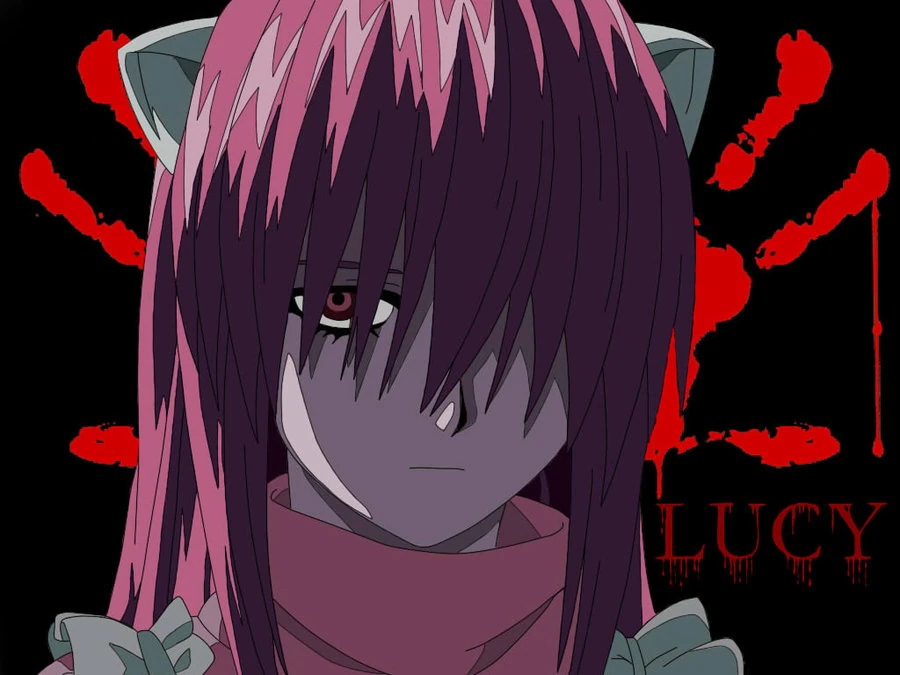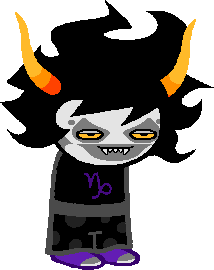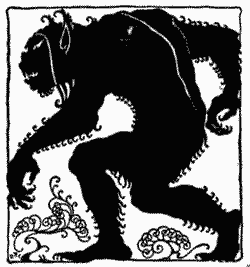It amazes me to see a character transform into something they've always been perceived as. The capacity to change is left behind in breaking nihilism, and all shred of rational thought is replaced with destructive glee. Whatever they were before is gone. All that is left is a shell. The monster.
It's almost as if they embrace the opposite of Nietzsche's advice, and do become the monsters they fight. I can name off a few characters that follow this, and embrace this odd train of thought. Despite their media and their train, they all carry the horrible burdens of being painted into corners.
Lucy.
 |
| Lucy the Diclonius from "Elfen Lied". A real "killer queen". |
The real monsters were the young boys who constantly picked on her. Pulled her hair. Called her a "demon". Brutally killed the puppy she had hid in the orphanage in front of her. She instantly became distraught. Shaken. How could somebody who looked like her contain so much capacity to kill? To be brutal?
She made a decision then. Humans? Not worth the effort after all. Never would be. If they wanted her to kill and ravage their bodies, then she'd willingly stab a pen through bullet proof armor. Tear off the head of an intern in her government capture facility. Even torture a young boy by killing his family in front of him in a moving train.
Gamzee Makara.
 |
| Gamzee Makara from "Homestuck". His HONK is far worse than his clubbing . . . then again, it may be even. |
Sure his father figure was never around, and he was always ingesting a toxic substance that made him see "miracles" and "rainbows", but that may or may not have really been "him", right? Because, he's harmless. A clown. A Juggalo. Did his friends have the right to ignore him when he was in the Land of Tents and Mirth? Or when he was in the lab with them? Or, even before, when they bad-mouthed him?
Was he aware? Did he mind?
He never seemed to. Until he ran out of his substance. He went dry. Sobered up real quick. And saw through the guise. He saw the looks on the faces of his troll "brothers" and "sisters". They weren't ones of mirth - they were of pain and suffering. Of fear of him. Because deep down, they knew. Oh, they knew all along.
So, he decided to rationalize that fear. And became the Bard of his, and everyone's, Rage.
And now, Grendel.
 |
| Grendel. The subtle example of how society morphs monsters into being. |
A sad, hairy little creature that sprung up from Biblical myth, and slowly wormed his way into the likes of Beowulf. Hunched over, abject, marvelously gorey, a hideous mother and backstory, and an aversion to songs of holy subject: everything that needs to be combined to make a monster.
And yet, he is never truly seen as a "monster" in Grendel by John Garner. Why evoke empathy to a creature who has a face only his similarly monstrous mother could love? Why feel anything for a being like him?
Because he was treated and forced to fit into the mold of "monster".
When Grendel is stuck between the two trees in the countryside, not only is he distraught over his mother not coming to his aid, but also to being judged by humans. He is called "a growth of some kind" by the humans, and later subjected to their inaccurate classifications of him being "some kind of oak tree spirit" (pages 24 and 25).
The crooked movements, the onslaught of insinuations, the ridicule were all enough to make him shout, scaring them. His initial meetings with humans reached him deeply, and his following shouts of them being crazy started to cement his ideas of humans. Wretched and suspicious creatures, with an idiotic mentality towards resources and gold.
Grendel soon found meaning and beauty in the songs of the Shaper in Hrothgar's hall. His words melted the heart of the young and resilient Grendel, and brought out new questions of an almost alien nature. He is found to question his role in the world, to possibly befriend or become someone else. If he had stayed this way . . .
The Shaper's later words of Grendel being a part of "the terrible race God cursed" were enough to send him spiraling (page 51). A cursed race. The one who had slain Cain. And he believed him. "Such was the power of the Shaper's harp!" (page 51). Grendel was overcome and distraught within seconds, and placed into a corner. Never could he really see himself reside in human company.
Never could he play the part of the Hero. He was cut and shaped into the form of a "monster" through the eyes of a society that he barely knew about, and barely understood. He does break into the Meadhall to try and beg for forgiveness, for mercy, but is met with . . . less than favorable results.
His encounter with the dragon also proves to force him back into the mold of being the villain. The dragon, while teaching the young Grendel his piece on nihilism and humans in general, is quick to cut down the hairy creature. The dragon, on suspicion of him not listening, states that nothing excites Grendel more than "excitement, violence" (page 67). Of course the younger beast cuts back roughly. The dragon's rebuttal?
One of sheer knowledge. As if he is aware of the outcome of their meeting, and of Grendel's life. The dragon then says this: "Ah, Grendel! You improve them, my boy! . . . You stimulate them! You make them think and scheme. . . . You are, so to speak, the brute existent by which they learn to define themselves. The exile, captivity, death they shrink from - ... that's what you make them recognize, embrace!" (page 73).
The one thing they chose to define themselves as. Humans had made him out to be the villain so someone else could step up and be the hero. Grendel had been in existence with humans long before he was fully aware, and was already worn into place. Into something he himself had no control over. His feelings, his actions, his life all became a product of what someone called "monstrous" or "demonic".
He did set out to stop this sort of "silly notion". To become something else than a monster. Alas, human nature does not sway so easily. He arrived in the meadhall of Hrothgar once more, but was ambushed and felt the excitement of killing all too easily. He found enjoyment in what he considered once to be something almost trivial. Barbaric.
He became the monster he was made out to be.
And yet, he is never truly seen as a "monster" in Grendel by John Garner. Why evoke empathy to a creature who has a face only his similarly monstrous mother could love? Why feel anything for a being like him?
Because he was treated and forced to fit into the mold of "monster".
When Grendel is stuck between the two trees in the countryside, not only is he distraught over his mother not coming to his aid, but also to being judged by humans. He is called "a growth of some kind" by the humans, and later subjected to their inaccurate classifications of him being "some kind of oak tree spirit" (pages 24 and 25).
The crooked movements, the onslaught of insinuations, the ridicule were all enough to make him shout, scaring them. His initial meetings with humans reached him deeply, and his following shouts of them being crazy started to cement his ideas of humans. Wretched and suspicious creatures, with an idiotic mentality towards resources and gold.
Grendel soon found meaning and beauty in the songs of the Shaper in Hrothgar's hall. His words melted the heart of the young and resilient Grendel, and brought out new questions of an almost alien nature. He is found to question his role in the world, to possibly befriend or become someone else. If he had stayed this way . . .
The Shaper's later words of Grendel being a part of "the terrible race God cursed" were enough to send him spiraling (page 51). A cursed race. The one who had slain Cain. And he believed him. "Such was the power of the Shaper's harp!" (page 51). Grendel was overcome and distraught within seconds, and placed into a corner. Never could he really see himself reside in human company.
Never could he play the part of the Hero. He was cut and shaped into the form of a "monster" through the eyes of a society that he barely knew about, and barely understood. He does break into the Meadhall to try and beg for forgiveness, for mercy, but is met with . . . less than favorable results.
His encounter with the dragon also proves to force him back into the mold of being the villain. The dragon, while teaching the young Grendel his piece on nihilism and humans in general, is quick to cut down the hairy creature. The dragon, on suspicion of him not listening, states that nothing excites Grendel more than "excitement, violence" (page 67). Of course the younger beast cuts back roughly. The dragon's rebuttal?
One of sheer knowledge. As if he is aware of the outcome of their meeting, and of Grendel's life. The dragon then says this: "Ah, Grendel! You improve them, my boy! . . . You stimulate them! You make them think and scheme. . . . You are, so to speak, the brute existent by which they learn to define themselves. The exile, captivity, death they shrink from - ... that's what you make them recognize, embrace!" (page 73).
The one thing they chose to define themselves as. Humans had made him out to be the villain so someone else could step up and be the hero. Grendel had been in existence with humans long before he was fully aware, and was already worn into place. Into something he himself had no control over. His feelings, his actions, his life all became a product of what someone called "monstrous" or "demonic".
He did set out to stop this sort of "silly notion". To become something else than a monster. Alas, human nature does not sway so easily. He arrived in the meadhall of Hrothgar once more, but was ambushed and felt the excitement of killing all too easily. He found enjoyment in what he considered once to be something almost trivial. Barbaric.
He became the monster he was made out to be.
 |
| The Joker had a similar metamorphosis. Except he also took a toxic waste bath. |
No comments:
Post a Comment